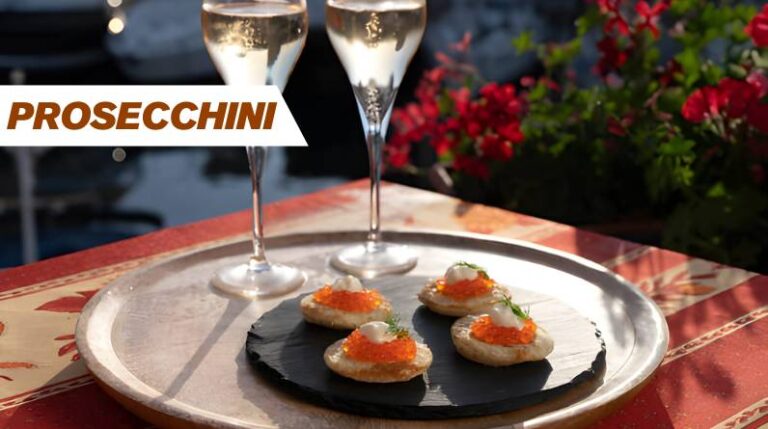In an era where food trends come and go with dizzying speed, prosecchini has emerged as something more enduring—a culinary philosophy that bridges the gap between traditional Italian cooking and contemporary wellness culture. Unlike fleeting Instagram fads, prosecchini represents a fundamental shift in how we approach dining, celebration, and community.
At its foundation, prosecchini is a zucchini-based dish traditionally paired with prosecco or sparkling beverages. However, reducing it to mere ingredients misses the bigger picture. The term itself—combining “prosecco” (the Italian sparkling wine symbolizing joy) with the diminutive suffix “-chini” (meaning “little” or “dear”)—reveals its true nature: an invitation to celebrate life’s small, meaningful moments through intentional eating.
This movement has captivated food enthusiasts worldwide, from Michelin-starred restaurants in Tokyo to farm-to-table bistros in Brooklyn, not because it’s revolutionary in technique, but because it taps into something deeply human—our craving for authentic connection in an increasingly digital world.
The Cultural Context: Why Prosecchini Resonates Now
The Wellness-Food Intersection
Prosecchini’s rise coincides with a broader cultural awakening around mindful consumption. Modern diners increasingly seek experiences that nourish both body and soul. This trend offers both:
- Nutritional Benefits: Low in calories (approximately 17 calories per 100g), high in vitamins A and C, and rich in antioxidants
- Emotional Fulfillment: The ritual of preparation and shared consumption creates meaningful social bonds
- Sustainability Alignment: Seasonal, locally-sourced zucchini supports environmental consciousness
- Dietary Flexibility: Naturally fits vegan, keto, gluten-free, and Mediterranean diets
Comparing Food Movements: Where Prosecchini Fits
| Movement | Core Focus | Social Element | Longevity Potential |
|---|---|---|---|
| Prosecchini | Mindful eating & celebration | Intimate gatherings | High – lifestyle integration |
| Farm-to-Table | Ingredient sourcing | Environmental awareness | Established trend |
| Hygge Food Culture | Comfort & coziness | Winter gatherings | Seasonal appeal |
| Plant-Based Movement | Health & ethics | Values-driven community | Growing mainstream |
The Italian Roots: From Rustic Kitchens to Global Phenomenon
Prosecchini’s story begins in Italy’s rural Mediterranean regions, where zucchini has been a dietary staple for centuries. Italian families have long transformed this humble summer squash into countless preparations—grilled, stewed, baked, or fried as fritters (zucchini fritti).
What changed in recent years was the intentional pairing with prosecco, elevating a simple vegetable side dish into a celebratory experience. This evolution mirrors Italy’s aperitivo culture, where pre-dinner drinks and light bites create social rituals that prioritize conversation over consumption.
The global spread accelerated through three key channels:
- Social Media Amplification: Instagram and TikTok users shared aesthetically pleasing presentations, generating millions of impressions
- Culinary Tourism: Travelers experiencing prosecchini in Italian trattorias brought the concept home
- Wellness Industry Adoption: Health-focused restaurants incorporated it into their menus as a “clean eating” option
Practical Guide: Creating Your Prosecchini Experience

Essential Preparation Techniques
Success with prosecchini lies in respecting the ingredient’s natural qualities. Here are proven methods:
Grilling Method:
Slice zucchini lengthwise into 1/4-inch ribbons. Brush with extra virgin olive oil, season with sea salt and cracked black pepper. Grill over medium-high heat for 2-3 minutes per side until tender with char marks.
Spiralizing Technique:
Use a spiralizer to create zucchini noodles (zoodles). Lightly sauté in garlic-infused olive oil for 60-90 seconds. Overcooking creates mushiness—the goal is al dente texture.
Roasting Approach:
Cut into 1-inch chunks, toss with olive oil and herbs (rosemary, thyme, oregano). Roast at 425°F (220°C) for 20-25 minutes until golden and caramelized.
Classic Prosecchini Recipes to Master
Appetizer: Prosecchini Crostini
- Grill zucchini ribbons until tender
- Toast artisan bread slices
- Spread ricotta mixed with lemon zest on toast
- Layer grilled prosecchini, finish with fresh basil and balsamic drizzle
- Pair with chilled prosecco
Main Course: Prosecchini Pasta Primavera
- Spiralize 3-4 medium zucchini
- Sauté garlic and cherry tomatoes in olive oil
- Add zucchini noodles, toss for 2 minutes
- Finish with fresh Parmesan, pine nuts, and torn basil
- Serve immediately to maintain texture
Unexpected Delight: Prosecchini Chocolate Muffins
- Grate 1 cup zucchini (squeeze out excess moisture)
- Mix with standard muffin batter plus cocoa powder
- The vegetable adds moisture without affecting chocolate flavor
- Creates guilt-free indulgence with hidden nutrition
The Science Behind the Appeal
Nutritional Profile Analysis
| Nutrient | Amount per 100g | % Daily Value | Key Benefit |
|---|---|---|---|
| Calories | 17 kcal | 1% | Weight management |
| Fiber | 1.0g | 4% | Digestive health |
| Vitamin C | 17.9mg | 30% | Immune support |
| Vitamin A | 200 IU | 4% | Eye health |
| Potassium | 261mg | 7% | Heart function |
| Water Content | 95% | – | Hydration |
The Psychology of Prosecchini Gatherings
Research in behavioral psychology explains why prosecchini experiences create lasting satisfaction. The combination of several factors triggers positive emotional responses:
- Ritual Formation: Repeated prosecchini gatherings create anticipation and positive associations
- Sensory Engagement: The visual presentation, aromatic herbs, and taste complexity activate multiple pleasure centers
- Social Bonding: Shared meal preparation releases oxytocin, strengthening interpersonal connections
- Mindful Consumption: Intentional eating practices increase satisfaction while reducing overconsumption
Addressing the Criticisms: A Balanced Perspective
No culinary trend exists without scrutiny, and prosecchini has faced legitimate questions:
Authenticity Concerns
Traditional Italian cooks sometimes argue that prosecchini represents unnecessary pretension around simple home cooking. This criticism has merit—there’s risk in over-commercializing humble ingredients. However, if prosecchini introduces people to mindful eating and Italian culinary values, the cultural exchange creates net positive outcomes.
Environmental Considerations
Increased demand for zucchini raises questions about sustainable farming. Consumers should prioritize:
- Locally-grown, seasonal zucchini over imported varieties
- Organic options when possible to reduce pesticide use
- Supporting small farms rather than industrial agriculture
- Growing zucchini in home gardens (remarkably easy and productive)
The “Instagram Trend” Critique
Skeptics dismiss prosecchini as performative dining for social media. While aesthetic presentation plays a role in its popularity, this criticism overlooks genuine benefits. If beautiful food photography encourages people to cook at home, experiment with vegetables, and share meals with loved ones, the outcome remains positive regardless of motivation.
The Future of Prosecchini: Predictions and Possibilities
Unlike many food fads, prosecchini shows indicators of lasting cultural integration:
- Restaurant Evolution: Major dining groups are developing prosecchini-focused concepts, suggesting industry confidence in longevity
- Product Innovation: Food manufacturers are creating prosecchini-inspired prepared foods, sauces, and seasoning blends
- Educational Integration: Cooking schools now include prosecchini preparation in curriculum, legitimizing it beyond trend status
- Cultural Expansion: The concept adapts beautifully to local cuisines—Korean prosecchini with gochujang, Mexican versions with lime and chili, Indian preparations with curry spices
Getting Started: Your First Prosecchini Experience
Ready to embrace this movement? Follow this beginner-friendly approach:
Step 1: Source Quality Ingredients
Visit a farmers market for fresh, organic zucchini. Look for medium-sized specimens (6-8 inches) with firm, unblemished skin. Avoid oversized zucchini, which tend toward bitter, watery texture.
Step 2: Set the Atmosphere
Prosecchini isn’t just about food—it’s about experience. Create ambiance with soft lighting, simple table settings, and background music. Keep phones away during the meal.
Step 3: Start Simple
Don’t overcomplicate your first attempt. Grilled prosecchini with quality olive oil, flaky sea salt, and a squeeze of lemon perfectly demonstrates the concept. Pair with chilled prosecco or sparkling water with citrus.
Step 4: Invite Connection
Share the experience with 2-3 close friends or family members. The intimate scale encourages genuine conversation and presence—the heart of prosecchini philosophy.
Conclusion: Beyond the Plate
Prosecchini represents more than a culinary technique or ingredient choice. It embodies a counter-movement to fast food culture, offering an alternative that prioritizes quality over quantity, connection over convenience, and presence over productivity.
In our hyperconnected yet increasingly isolated society, prosecchini creates permission to slow down. It transforms ordinary zucchini into an opportunity for celebration, proving that luxury isn’t found in expensive ingredients or elaborate techniques, but in the attention we bring to simple pleasures.
Whether prosecchini remains a cultural fixture for decades or evolves into something new, its core message endures: the most nourishing meals feed both body and soul. In that sense, prosecchini isn’t just a food trend—it’s a reminder of what truly matters when we gather around the table.
The question isn’t whether prosecchini will last, but whether we’ll embrace the values it represents: mindfulness, community, gratitude, and joy in life’s simplest moments. That’s a trend worth sustaining.


